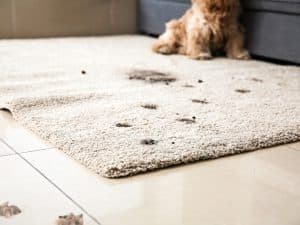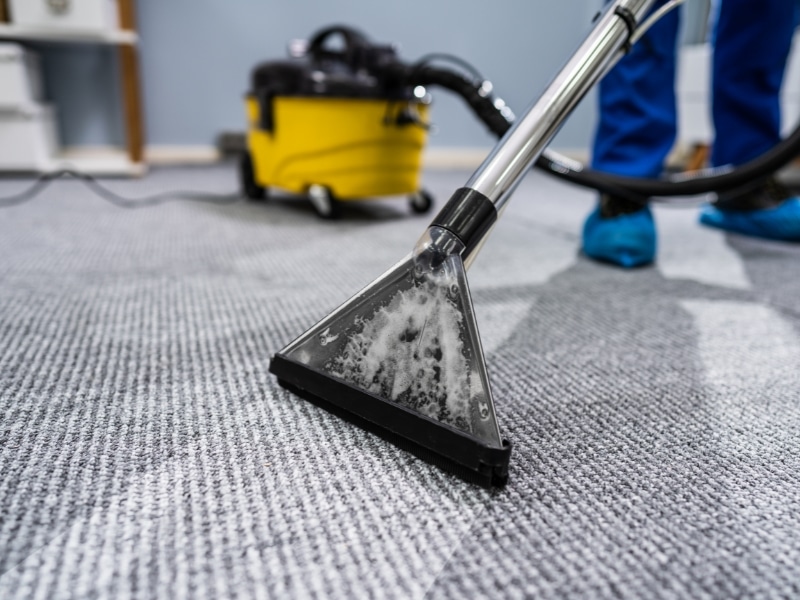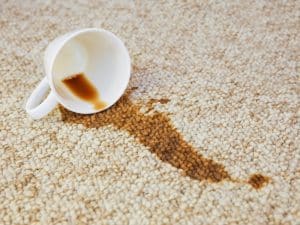Carpet cleaning in NDIS homes is crucial in ensuring a safe, hygienic, and comfortable living environment for individuals with disabilities. As NDIS participants often spend significant time at home, maintaining cleanliness, especially in high-traffic areas like carpets, is vital for their health and well-being. The importance of carpet cleaning goes beyond enhancing the aesthetic appeal of a space; it also contributes to the overall functionality of the living area. This article will explore why carpet cleaning is essential in NDIS homes.
Why is carpet cleaning crucial for NDIS homes?
Keeping a clean home environment is essential for people with disabilities. It’s not just about appearances — it’s crucial for health, safety, and comfort. Dirty carpets can trap allergens, bacteria, and dust mites, seriously affecting the health of those with weakened immune systems or respiratory conditions.
Key reasons why carpet cleaning is crucial for NDIS homes:
- Health and safety: Clean carpets reduce the risk of respiratory issues and allergies.
- Improved air quality: Regular carpet cleaning helps eliminate dust, allergens, and pollutants accumulating in fibres.
- Comfort: A clean carpet provides a more comfortable environment for individuals who spend long hours at home.
- Extended lifespan of carpets: Regular cleaning helps maintain carpet quality and longevity, saving costs in the long term.
- Enhanced appearance: A freshly cleaned carpet improves the overall look of a home, making it more welcoming.
Understanding the importance of carpet cleaning is crucial, as it is a significant part of home maintenance for NDIS clients. It contributes to the overall health and comfort of the residents and helps maintain a clean, pleasant environment for those who need it most.
When should carpet cleaning be done in NDIS homes?
Carpet cleaning frequency in NDIS homes depends on various factors, such as the number of residents, the level of foot traffic, and the specific health needs of the individuals living there. It is important to create a cleaning schedule tailored to the home’s requirements.
When to clean carpets in NDIS homes:
- High foot traffic: Regular cleaning is essential in homes with multiple people moving around frequently.
- Post-illness: Carpets should be cleaned after sickness, particularly respiratory infections or allergies, to eliminate bacteria or allergens.
- Before moving in: To ensure a hygienic start, clean the carpets thoroughly before a new NDIS participant moves in.
- Seasonal cleaning: Carpets should be cleaned at least twice yearly to remove accumulated dirt and allergens.
- Visible stains or spills: Any visible stains or spills should be cleaned promptly to avoid stains from setting in.
Sticking to a cleaning schedule can prevent potential issues and maintain a healthy environment for all NDIS residents.
How can carpet issues affect daily activities for NDIS clients?
Dirty or damaged carpets can hinder NDIS clients’ daily activities and mobility, creating obstacles that increase fall risks, especially for individuals with limited mobility. Carpet issues requiring urgent NDIS cleaning, such as lumps, bumps, or hard-to-clean stains, can make navigating the home more difficult.
How carpet issues can affect daily activities:
- Increased risk of falls: Irregular surfaces or loose carpets can cause trips and falls, which can be dangerous for those with mobility issues.
- Difficulty in movement: Dirty or damaged carpets may make it harder for individuals using wheelchairs or walkers to move freely.
- Allergy flare-ups: Accumulated dust, pet dander, and allergens can exacerbate respiratory issues or allergies, affecting day-to-day comfort.
- Mental stress: Unclean environments may contribute to feelings of unease or discomfort, affecting residents’ mental well-being.
Regular carpet cleaning can prevent these issues, ensuring a safer and more comfortable living environment for NDIS participants.
What are the common carpet issues in NDIS homes?
In NDIS homes, maintaining carpet quality is essential for both hygiene and comfort. Here are some common carpet issues that often arise.
Common carpet issues in NDIS homes:
Issue | Cause | Impact |
Stains | Food spills | Harder cleaning |
Dust | Pollen, dander | Poor air quality |
Wear | High traffic | Damaged fibres |
Odours | Dirt, moisture | Unpleasant smells |
Mould | Damp areas | Health risk |
Addressing these issues promptly with professional carpet cleaning can prevent further damage and maintain a healthier living space.
How does carpet cleaning contribute to health and hygiene?
Carpets trap dirt, dust, and allergens, which can negatively impact residents’ health, particularly those with respiratory conditions or allergies. Regular carpet cleaning enhances indoor air quality and lowers the risk of health issues linked to unclean carpets.
How carpet cleaning improves health and hygiene:
- Eliminates bacteria and allergens: Professional cleaning removes harmful bacteria, dust mites, and allergens that could cause health problems.
- Prevents the growth of mould: Moisture in carpets can lead to mould growth, but cleaning helps reduce the chances of this occurring.
- Promotes respiratory health: Clean carpets ensure optimal air quality, especially for those with asthma or other respiratory conditions.
- Reduces the spread of infections: Regular cleaning ensures that harmful germs are eliminated, reducing the spread of diseases.
Keeping the carpets clean contributes to a healthier living environment for NDIS residents.
Who benefits from carpet cleaning in NDIS homes?
Understanding the importance of carpet cleaning reveals a range of benefits for everyone involved in an NDIS home. While NDIS clients are the primary beneficiaries, caregivers, family members, and others also enjoy the rewards of regular carpet cleaning.
Who benefits the most from carpet cleaning:
- Individuals with respiratory issues: Those with asthma or allergies experience fewer flare-ups with clean carpets.
- For people with mobility challenges, clean carpets help prevent accidents and allow for easier movement within the home.
- Children and elderly residents: Children or elderly individuals, who may be more vulnerable to falls or health problems, benefit from a cleaner environment.
- Families with pets: Pets often bring in dirt, allergens, and dander, so regular carpet cleaning is essential for maintaining a healthy environment.

How does carpet cleaning contribute to the well-being of NDIS clients?
Carpet cleaning enhances the physical environment and positively affects the emotional and mental well-being of NDIS clients. Maintaining hygiene with NDIS-funded carpet cleaning helps create a clean, fresh-smelling home, improving moods and fostering a sense of comfort and security.
How carpet cleaning impacts well-being:
- Creates a positive living environment: A clean home helps NDIS participants feel proud and comfortable.
- Enhances mental health: A clutter-free, hygienic space contributes to a sense of calm and reduces stress.
- Promotes independence: A clean, well-maintained environment allows NDIS clients to move around freely, boosting their confidence and independence.
- Encourages social engagement: A clean and welcoming environment makes hosting visitors or participating in social activities easier.
Maintaining a clean carpet fosters a positive, supportive environment for NDIS clients, contributing to their overall well-being.
Conclusion
In conclusion, the importance of carpet cleaning in NDIS homes cannot be overstated. Not only does it contribute to a cleaner, healthier, and safer environment, but it also enhances the well-being of individuals with disabilities. By prioritising regular carpet maintenance, you ensure that residents enjoy a comfortable, hygienic living space, supporting their health and daily activities.
Looking for reliable NDIS carpet cleaning? Discover how Ahsan Care Provider can support your home’s cleanliness and comfort with care.



